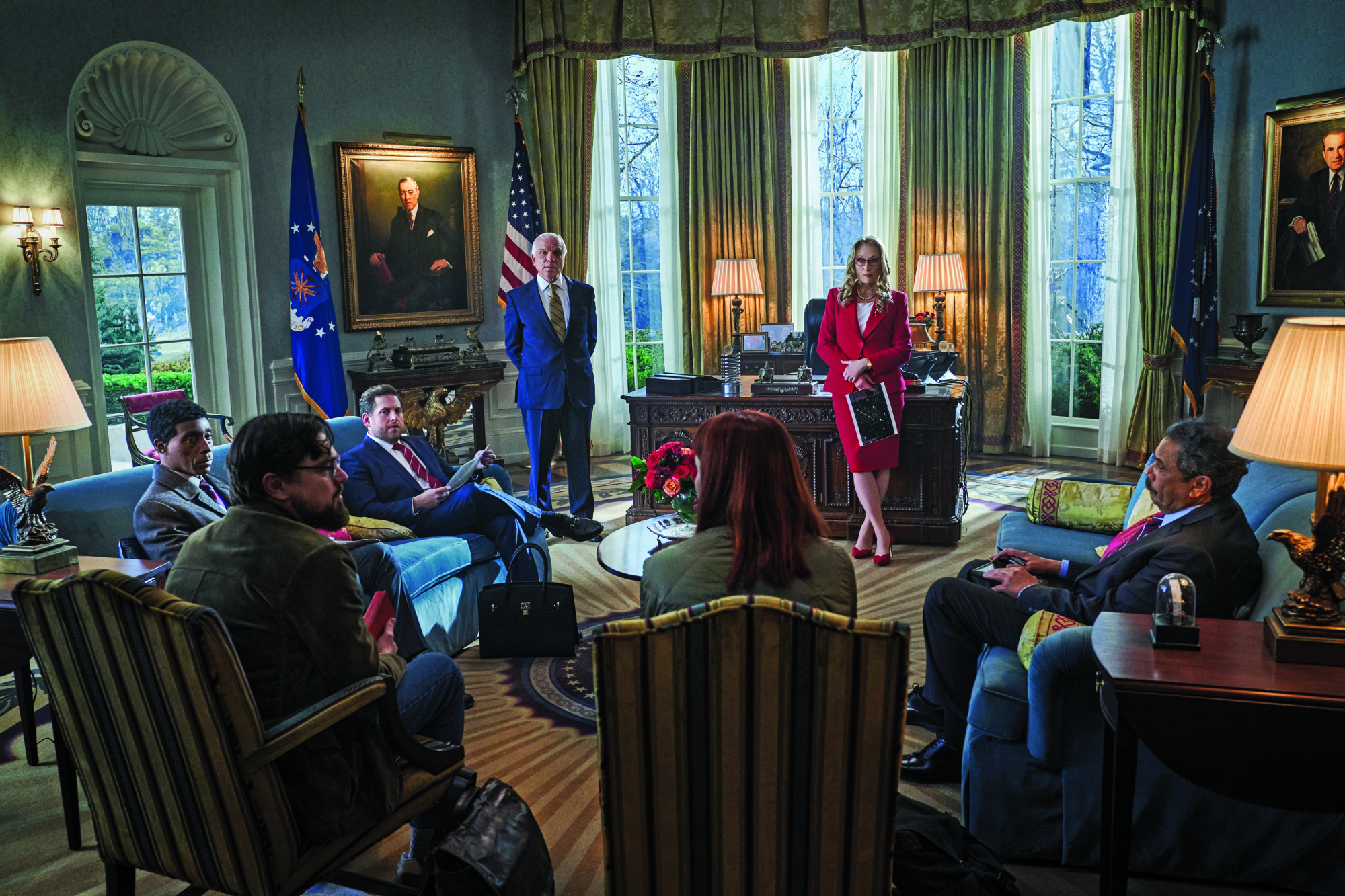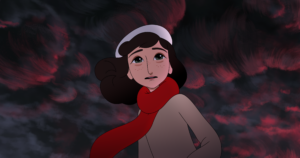Don’t Look Up (Adam McKay, 2021) was one of last year’s more polarising films. Released on Netflix in December, the film was ensured attention thanks to its high-wattage cast – including Leonardo DiCaprio, Jennifer Lawrence, Meryl Streep and Timothée Chalamet – and contentious subject matter. The subject in question is the end of the world. McKay’s screenplay uses the threat of a world-ending comet to satirise the contemporary phenomenon of science denial and, more specifically, the recently dethroned Donald Trump administration in the United States.
The film received a comparatively warm reception from awards bodies; among a bevy of recognitions, the Academy Awards nominated Don’t Look Up for Best Picture, Best Original Screenplay, Best Original Score and Best Film Editing (though producers ultimately walked away empty-handed). Critics were less enthused. McKay’s approach to satire – driven by his history in broad comedies such as Anchorman: The Legend of Ron Burgundy (2004) and Step Brothers (2008) and his antipathy for right-wing politics – has never been to everyone’s tastes, and the unsubtlety of Don’t Look Up earnt plaudits and derision in roughly equal measure, from both sides of the political divide.[1]See, for example, Charles Bramesco, ‘Look Away: Why Star-studded Comet Satire Don’t Look Up Is a Disaster’, The Guardian, 27 December 2021, <https://www.theguardian.com/film/2021/dec/27/look-away-why-star-studded-comet-satire-dont-look-up-is-a-disaster>; and Clarisse Loughrey, ‘Don’t Look Up Review: Jennifer Lawrence Is Back to Business in This Punchy, Funny Climate Change Satire’, The Independent, 24 December 2021, <https://www.independent.co.uk/arts-entertainment/films/reviews/dont-look-up-review-netflix-stream-b1981973.html>, both accessed 9 May 2022. It also provoked broader debates about the politics of film criticism, with some cultural commentators – along with the director himself, who hit back at naysayers on Twitter – suggesting that those dismissing the film as overly didactic were not fully grasping the extent of the climate emergency.[2]See Dani Di Placido, ‘The Reaction to Netflix’s Don’t Look Up Is More Interesting than the Film Itself’, Forbes, 6 January 2022, <https://www.forbes.com/sites/danidiplacido/2022/01/06/the-reaction-to-netflixs-dont-look-up-is-more-interesting-than-the-film-itself/?sh=17a48d8320cf>; and George Monbiot, ‘Watching Don’t Look Up Made Me See My Whole Life of Campaigning Flash Before Me’, The Guardian, 5 January 2022, <https://www.theguardian.com/commentisfree/2022/jan/04/dont-look-up-life-of-campaigning>, both accessed 9 May 2022. In short: whether you like Don’t Look Up or not, it’s impossible to deny it started a conversation.
That conversation is ripe to continue in the classroom. Though much of the film is preoccupied with excoriating contemporary American discourse – inane breakfast ‘news’ shows, egotistical politicians and Silicon Valley robber barons – it’s also squarely situated in science. Surrounding Don’t Look Up’s political parody is an examination of how scientists track celestial objects, the importance of peer review and the potential of a ‘planet killer’ comet impacting the Earth.
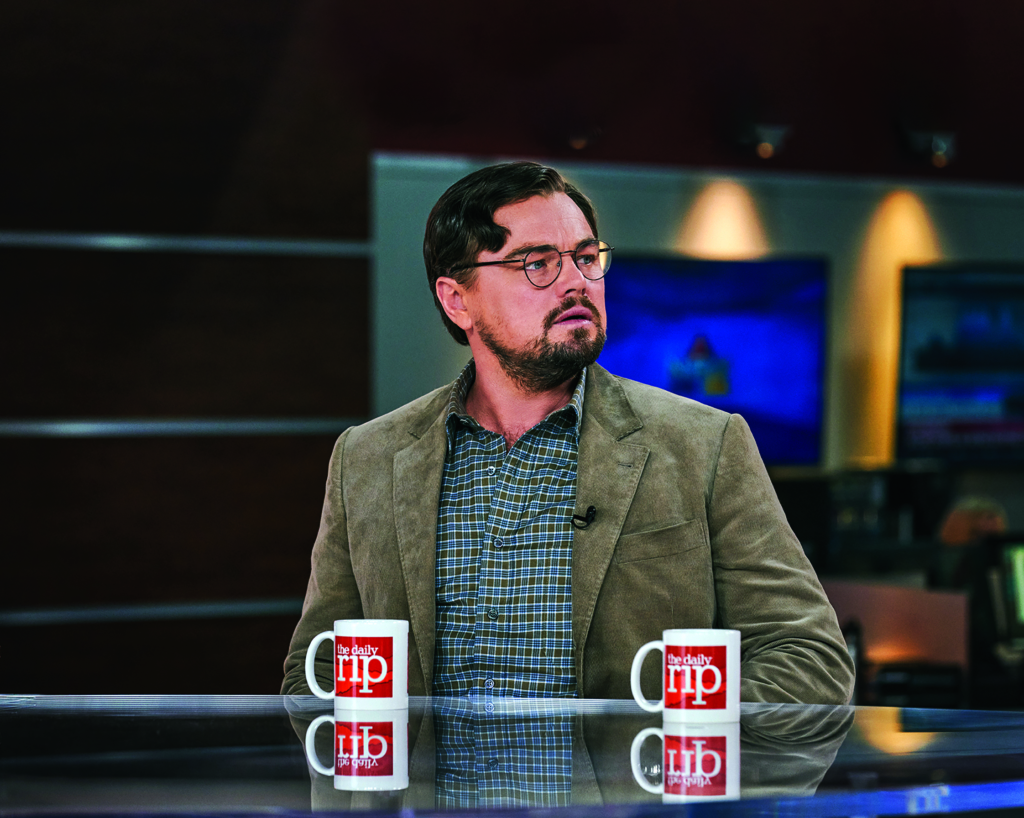
Shooting stars
Don’t Look Up begins with a discovery. PhD candidate Kate (Lawrence) identifies the unmistakable streak of a comet through a telescope, prompting celebrations – and calculations. After her supervisor, Randall (DiCaprio), does some preliminary number crunching, they realise that said comet – measuring almost ten kilometres wide – is on a collision course with Earth. After some careful confirmation and contact with America’s Planetary Defense Coordination Office (a real place, the film makes a point of confirming), the plot is underway.
Recognising that the ability to show an entire feature film to a science class is a rare luxury (especially a film running almost two-and-a-half hours), there’s enough in these opening minutes to frame a number of lessons in secondary Science or Physics. Students could be prompted to explore how ‘new’ celestial objects are actually identified: is it truly up to PhD candidates to scour the night sky through a telescope in the hope of spotting something unfamiliar, or is McKay taking dramatic liberties here? Or the class could learn about the science underpinning Randall’s calculations, starting with Kepler’s laws of planetary motion – a mainstay of secondary astrophysics and a regular feature in this column. Alternatively, inquiring minds might perhaps explore the history and purpose of the aforementioned Planetary Defense Coordination Office, and whether it has counterparts outside the United States.
All these options have merit, but to focus more directly on the film, I’d encourage teachers and students to ask a different question: Why a comet? (Not in a metaphysical sense, but from a screenwriting perspective!)
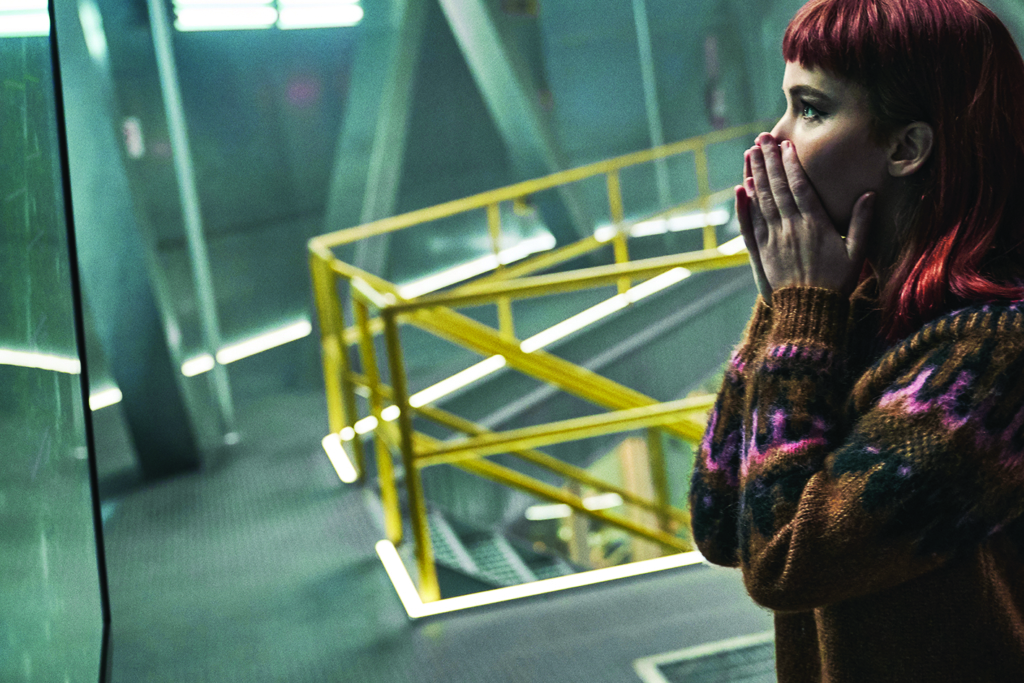
McKay’s satires eschew ambiguity. As such, Don’t Look Up’s primary purpose is clear: to draw attention to – and, ultimately, make a mockery of – the contemporary conservative vein of science denial as realised in the reaction of the US Republican Party to climate change and, more recently, COVID-19. Though it seems unlikely that McKay substantively incorporated COVID controversies into his screenplay – while the onset of the virus delayed filming by months, the production largely predated the rise of COVID denial and anti-mask sentiment[3]See Kevin Slane, ‘Adam McKay Reveals How 603 People Banded Together in Boston to Film Don’t Look Up’, Boston.com, 18 January 2022, <https://www.boston.com/culture/movies/2022/01/18/adam-mckay-dont-look-up-podcast/>, accessed 9 May 2022. – the choice of a comet rather than an asteroid aligns more closely with the threat of a pandemic than of climate change. The comet identified by Kate threatens to hit the Earth in just over six months; had it been a (by definition, slower-moving) asteroid, the threat would be far less pressing with respect to time.
The comet’s alignment to the immediate threat of a pandemic – which can sweep through the world in weeks, not years – versus that of climate change, which has been mounting over decades if not centuries, is clear. There’s a lot to think about here for budding scientists; discussing these parallels requires an understanding of the history and nature of climate change, the mathematics behind an accelerating pandemic and the astrophysics of asteroids and comets alike.
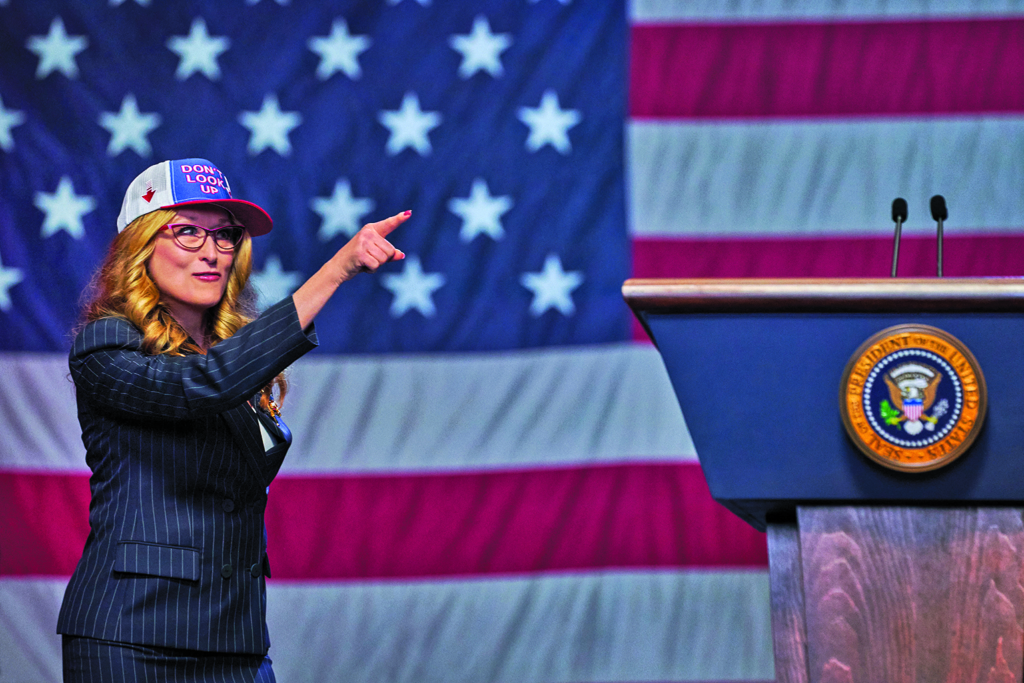
These choices aren’t arbitrary, either. Don’t Look Up’s leading science consultant, astronomer Amy Mainzer, explains in an interview that she considered questions like:
What sort of [Earth-threatening] object would it be? Would it be an asteroid or a comet? How do we highlight the film’s points that we’re trying to make about the importance of science, and science denialism, and how harmful that is to the culture of science?[4]Amy Mainzer, quoted in Don Kaye, ‘The Real Science Behind Don’t Look Up: Could It Happen?’, Den of Geek,24 December 2021, <https://www.denofgeek.com/movies/real-science-dont-look-up-could-happen/>, accessed 9 May 2022.
Based on her recommendations, the filmmakers ultimately decided to use a comet rather than an asteroid, Mainzer says:
I deliberately picked an object that is a long–period comet. It’s a comet that comes from the outer part of the solar system, and these objects really do come in with incredible velocity with respect to the Earth. They can be very large.[5]ibid.
Beyond the science, there’s a compelling conversation to be had here about whether the short timeline before the comet’s impact contributes to or detracts from the film’s intended messages … though that might be better left for the Media Arts classroom.
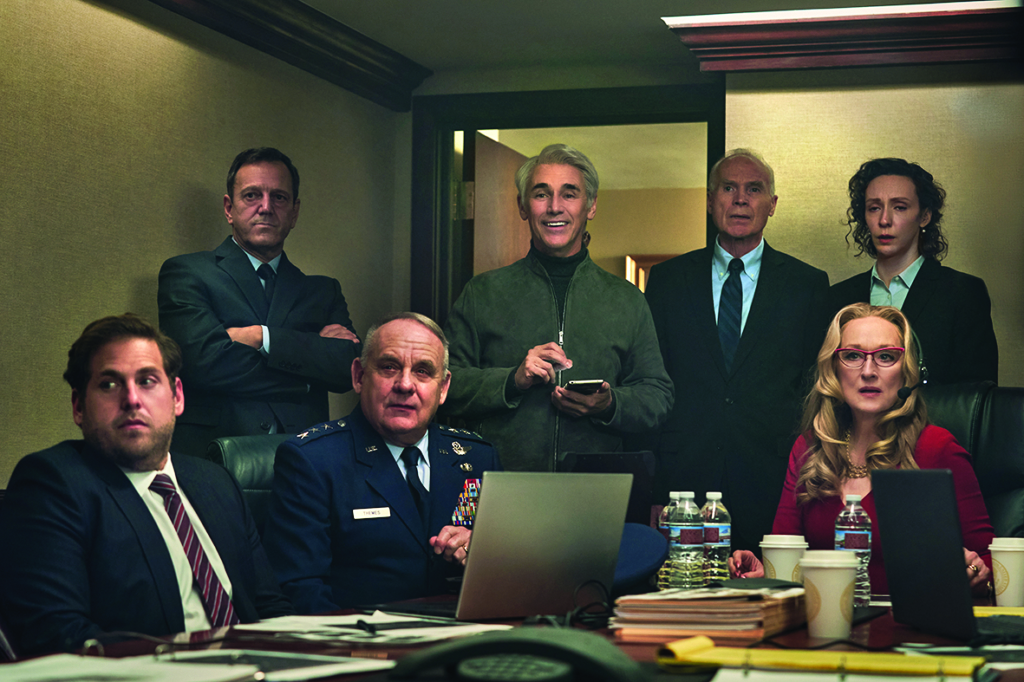
Peer review and scientific communication
Don’t Look Up presents a caricatured portrait of modern America, and it’s far from complimentary. Streep’s venal President Orlean and her team are an exaggeration of McKay’s impression of Trumpian politics – driven solely by self-interest and characterised by disingenuous communication. Archetypal tech billionaire Peter Isherwell (Mark Rylance), meanwhile, is an amalgamation of entrepreneur Elon Musk and Apple CEO Tim Cook: eccentric, with an air of benevolence, but ultimately driven by corporate profiteering. But the caricatures most relevant to the science classroom come from the fourth estate: Tyler Perry’s and Cate Blanchett’s frivolous morning news co-hosts.
The relevance of breakfast TV – characterised here by quips and an emphasis on light entertainment above all else – to scientific studies might not immediately be apparent. But one of the challenges facing scientists, as well as the prospective ones in your classroom, is how to communicate outside the discipline. Like most academics, scientists report their findings through peer-reviewed journal articles that tend to be pitched to those in their field, relying on an assumption of prior knowledge and technical language that can be opaque to laypeople. If you’ve ever seen a television interview with a scientist, you’ll be aware that this mode of communication doesn’t always translate well.

McKay’s screenplay attempts to capture that problem in its breakfast television segments, in which the hosts’ emphasis on a breezy tone and the audience’s fixation on the attractiveness of the scientists stymies Randall and Kate’s attempts to share their message. Understanding and examining these challenges helps students prepare for their own potential careers – or even for how to frame their school reports – while also contextualising why media messages on scientific issues might misrepresent underlying facts.
Still, I’d argue that Don’t Look Up missed a trick here in its framing of the intersection between science and the mainstream media. One can forgive the implausibility of a character played by Lawrence being dismissed as untelegenic, but other flaws are more glaring on reflection: for instance, surely anyone with a modicum of media training would have recognised that the correct forum for news of a ‘planet killer’ comet would be a serious news outlet rather than a lighthearted breakfast program. Science in the media is usually either framed as trivial or terrifying – witness how often news outlets resort to scaremongering over sober facts[6]See, for example, Dean Burnett, ‘Terrifying Ebola “Facts” for Enhanced Scaremongering’, The Guardian, 6 August 2014, <https://www.theguardian.com/science/brain-flapping/2014/aug/06/terrifying-facts-ebola-for-scaremongering>; and Jon Silverman, ‘The Only Thing We Have to Fear Is Dodgy Crime Reporting’, The Conversation, 1 May 2015, <https://theconversation.com/the-only-thing-we-have-to-fear-is-dodgy-crime-reporting-41058>, both accessed 9 May 2022. – meaning that the scientists’ struggle to find willing media organisations rings false. This is presumably a symptom of McKay trying to align the comet with the much slower threat of climate change, but it undermines this aspect of the commentary.

More effective is Don’t Look Up’s choice to highlight the importance of peer review. Peer review, in which research papers are rigorously checked and challenged by fellow experts prior to publication, is a decidedly unsexy aspect of science, but it’s crucial to the reliability of the scientific method. In the second half of the film, Randall aligns himself with Peter and his plan to safely break up the comet to mine the rare-earth materials contained therein, but he soon finds himself frustrated by the lack of any peer review driving Peter’s (ultimately doomed) scheme.
Understanding the necessity of peer review – and the difference between corporate ‘science’ and its academic equivalent – is a fruitful topic of discussion in the classroom. To make science seem exciting, us teachers often lean on its quest for knowledge: Science is about asking questions, exploring, finding answers! This is all true, but there’s real danger if those questions aren’t vetted or that data isn’t double-checked. Tempering the excitement of science with the need for precision – and peer review – is an important conversation to have, and Don’t Look Up sets it up beautifully.
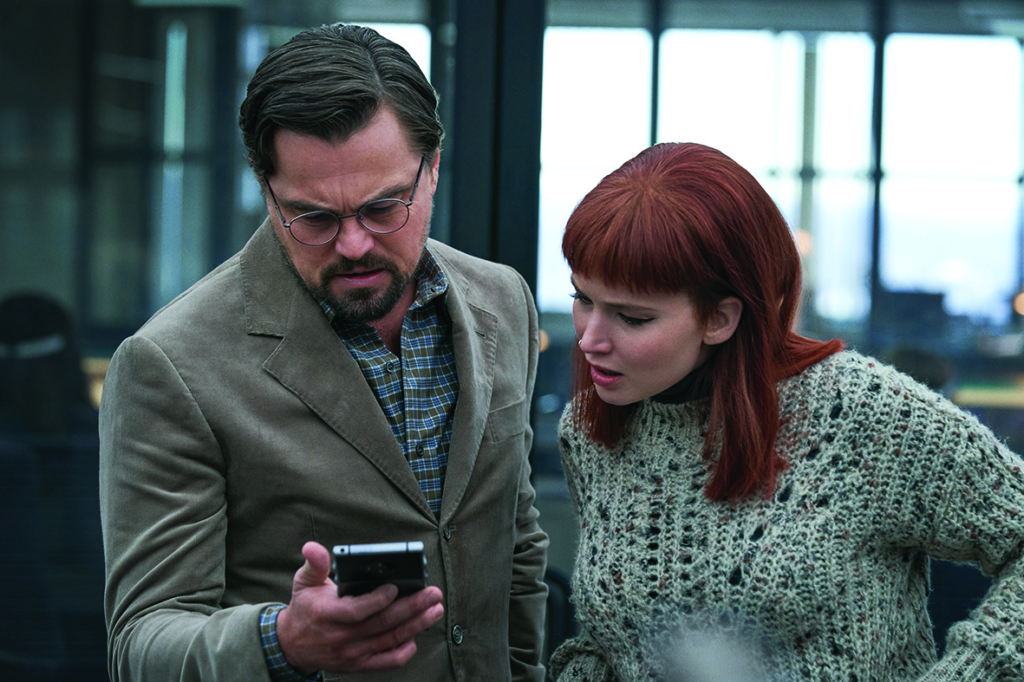
Not with a whimper but a bang
The final act of Don’t Look Up sees the film ratchet up its satire. Desperate to distract the populace from the imminent doom growing brighter in the sky, Orlean rouses her base with the film’s titular exhortation, which becomes a catchcry and slogan affixed to red baseball caps. Though this satirical approach is as blunt as they come, I’ll freely admit it seems less implausible in the wake of the various shades of COVID denialism that have flourished over the last couple of years.[7]See Tanya Lewis, ‘Eight Persistent COVID-19 Myths and Why People Believe Them’, Scientific American, 12 October 2020, <https://www.scientificamerican.com/article/eight-persistent-covid-19-myths-and-why-people-believe-them/>, accessed 9 May 2022. And, whatever your take on the film’s final quarter, it’s hard to deny the effectiveness of its closing minutes: with Peter’s plan backfiring and no other countries able to avert the comet’s impact, the story ends with a family dinner – and a shock wave annihilating everything in its wake.
If the science in this piece has seemed a touch dry so far, this coda presents the perfect opportunity to pivot into something more … explosive. After all, what is popular science all about if not watching things explode?
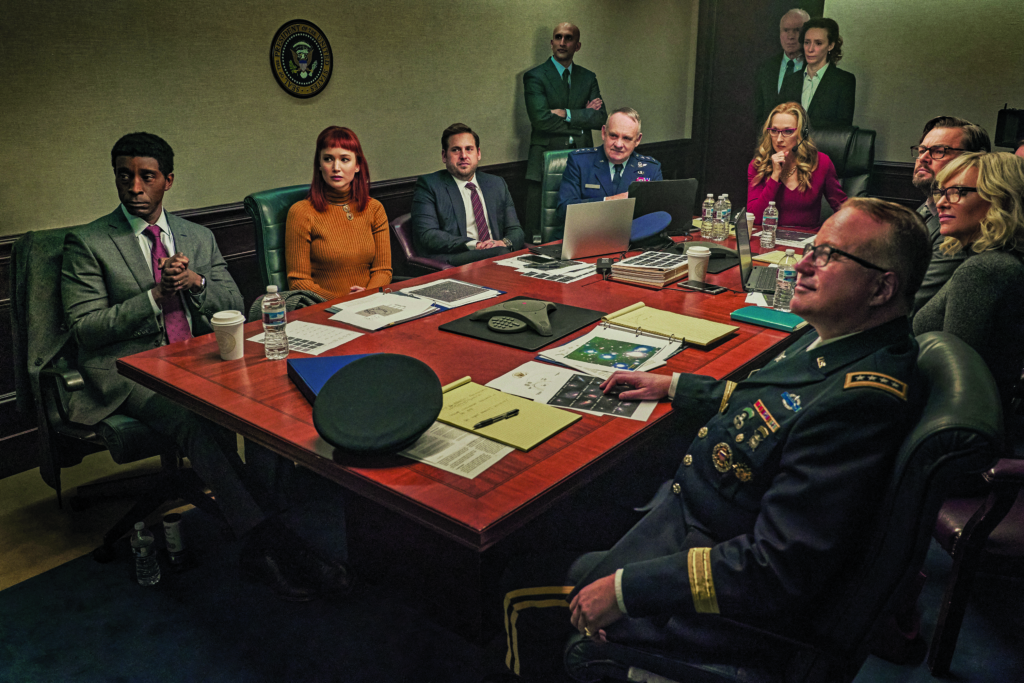
The first question to ask is whether or not the film is realistic. Though largely grounded in science fact rather than fiction, the destruction wrought by the comet might rely on a little creative licence. Astrophysics professor Megan Donahue notes that ‘the one thing that was a little overblown in the movie was that a comet of that size […] wouldn’t disrupt the entire Earth’s crust and send a shockwave rippling around the planet’.[8]Megan Donahue, quoted in Selma Cogo, ‘Real MSU Astronomers Break Down the Science in Netflix Film Don’t Look Up’, The State News,19 January 2022, <https://statenews.com/article/2022/01/real-msu-astronomers-break-down-the-science-in-netflix-film-dont-look-up>, accessed 9 May 2022. (Granted, Donahue may not have hung around for the post-credits scene in which it’s revealed that Orlean’s chief of staff survived the impact. So perhaps its lethality has been slightly exaggerated.)
What would happen if a ten-kilometre-wide comet – or, say, asteroid – hit the Earth? This is far from a hypothetical question, since scientists credit the extinction of the dinosaurs to the impact of an asteroid just that size.
Realistic or not, what would happen if a ten-kilometre-wide comet – or, say, asteroid – hit the Earth? This is far from a hypothetical question, since scientists credit the extinction of the dinosaurs to the impact of an asteroid just that size (as evidence by the Chicxulub crater in Mexico).[9]See Becky Ferreira, ‘The Rock That Ended the Dinosaurs Was Much More than a Dino Killer’, The New York Times, 13 September 2021, <https://www.nytimes.com/2021/09/13/science/chicxulub-dinosaur-extinction.html>, accessed 9 May 2022. That impact killed off around three-quarters of the Earth’s plant and animal population, but that’s believed to have largely resulted from the incredible climate disruption caused by the debris blanketing the atmosphere.

There’s plenty for students to explore here: What, precisely, caused this climate devastation, and how do scientists know this? Would we expect the same results if a comet of roughly the same size were to hit today? And is there any way we could prevent – or survive – this impact?
You could also investigate the backup option selected by Orlean, Peter and a suite of other oligarchs – flying off in a spaceship and being placed in an indefinite cryosleep until an exoplanet is located – but, to be honest, that might be straying a touch too far into science fiction. If you’re interested in exploring those concepts in the classroom, though, I’d recommend digging up the very first instalment of Cinema Science, centring on Passengers (Morten Tyldum, 2016).[10]David Crewe, ‘Cinema Science: Passengers and the Specifics of Space’, Screen Education, no. 86, 2017, pp. 42–9.
Endnotes
| 1 | See, for example, Charles Bramesco, ‘Look Away: Why Star-studded Comet Satire Don’t Look Up Is a Disaster’, The Guardian, 27 December 2021, <https://www.theguardian.com/film/2021/dec/27/look-away-why-star-studded-comet-satire-dont-look-up-is-a-disaster>; and Clarisse Loughrey, ‘Don’t Look Up Review: Jennifer Lawrence Is Back to Business in This Punchy, Funny Climate Change Satire’, The Independent, 24 December 2021, <https://www.independent.co.uk/arts-entertainment/films/reviews/dont-look-up-review-netflix-stream-b1981973.html>, both accessed 9 May 2022. |
|---|---|
| 2 | See Dani Di Placido, ‘The Reaction to Netflix’s Don’t Look Up Is More Interesting than the Film Itself’, Forbes, 6 January 2022, <https://www.forbes.com/sites/danidiplacido/2022/01/06/the-reaction-to-netflixs-dont-look-up-is-more-interesting-than-the-film-itself/?sh=17a48d8320cf>; and George Monbiot, ‘Watching Don’t Look Up Made Me See My Whole Life of Campaigning Flash Before Me’, The Guardian, 5 January 2022, <https://www.theguardian.com/commentisfree/2022/jan/04/dont-look-up-life-of-campaigning>, both accessed 9 May 2022. |
| 3 | See Kevin Slane, ‘Adam McKay Reveals How 603 People Banded Together in Boston to Film Don’t Look Up’, Boston.com, 18 January 2022, <https://www.boston.com/culture/movies/2022/01/18/adam-mckay-dont-look-up-podcast/>, accessed 9 May 2022. |
| 4 | Amy Mainzer, quoted in Don Kaye, ‘The Real Science Behind Don’t Look Up: Could It Happen?’, Den of Geek,24 December 2021, <https://www.denofgeek.com/movies/real-science-dont-look-up-could-happen/>, accessed 9 May 2022. |
| 5 | ibid. |
| 6 | See, for example, Dean Burnett, ‘Terrifying Ebola “Facts” for Enhanced Scaremongering’, The Guardian, 6 August 2014, <https://www.theguardian.com/science/brain-flapping/2014/aug/06/terrifying-facts-ebola-for-scaremongering>; and Jon Silverman, ‘The Only Thing We Have to Fear Is Dodgy Crime Reporting’, The Conversation, 1 May 2015, <https://theconversation.com/the-only-thing-we-have-to-fear-is-dodgy-crime-reporting-41058>, both accessed 9 May 2022. |
| 7 | See Tanya Lewis, ‘Eight Persistent COVID-19 Myths and Why People Believe Them’, Scientific American, 12 October 2020, <https://www.scientificamerican.com/article/eight-persistent-covid-19-myths-and-why-people-believe-them/>, accessed 9 May 2022. |
| 8 | Megan Donahue, quoted in Selma Cogo, ‘Real MSU Astronomers Break Down the Science in Netflix Film Don’t Look Up’, The State News,19 January 2022, <https://statenews.com/article/2022/01/real-msu-astronomers-break-down-the-science-in-netflix-film-dont-look-up>, accessed 9 May 2022. |
| 9 | See Becky Ferreira, ‘The Rock That Ended the Dinosaurs Was Much More than a Dino Killer’, The New York Times, 13 September 2021, <https://www.nytimes.com/2021/09/13/science/chicxulub-dinosaur-extinction.html>, accessed 9 May 2022. |
| 10 | David Crewe, ‘Cinema Science: Passengers and the Specifics of Space’, Screen Education, no. 86, 2017, pp. 42–9. |
